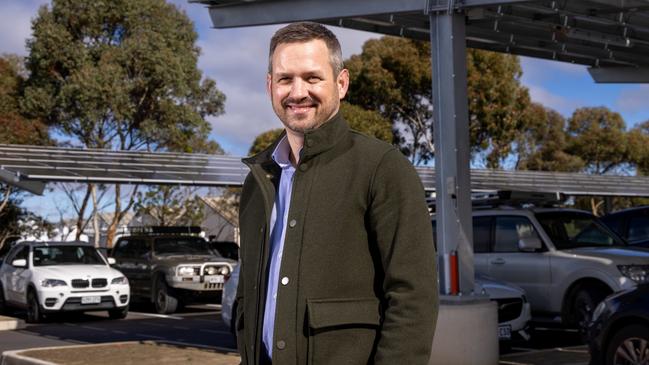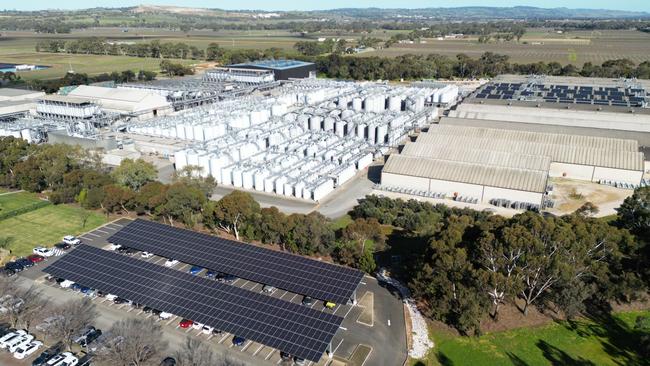Treasury switches on 6000 solar panels at Barossa production site
Penfolds owner Treasury Wine Estates says it now operates the largest solar network of any wine producer in Australia and is on track to soon be using 100 per cent renewables.

Business
Don't miss out on the headlines from Business. Followed categories will be added to My News.
Penfolds owner Treasury Wine Estates says it’s on track to transition to 100 per cent renewable electricity by the end of next year after switching on close to 6000 solar panels at a flagship production facility in the Barossa Valley.
With the project going live on Tuesday, and another solar installation at the company’s Karadoc winery near Mildura reaching completion next week, TWE claims it now operates the largest solar network of all wine producers in Australia, generating more than 5500MWh of electricity a year - the equivalent of powering 900 homes.
TWE, which owns brands such as Penfolds, Wolf Blass, Pepperjack and Squealing Pig, has a global target to transition to 100 per cent renewable electricity by 2024 and net zero carbon emissions by 2030.

The company is currently installing 13,000 solar panels across its US production sites, including at its Beaulieu Vineyard, Beringer Vineyards, Etude Winery, and Frank Family Vineyards in Napa Valley.
TWE chief supply & sustainability officer Kerrin Petty said installing solar panels was the most significant contribution the company could make in its move to net zero.
“Unveiling the solar system here in the Barossa complements the other systems that are already operational, or scheduled to be completed in the coming year, at our sites in Australia, New Zealand, France, Italy, and the US,” he said.
“Our Napa Valley, California installation of 13,000 solar panels will make it the largest winery solar system in the US, generating half the electricity needs for each of our US wineries. It’s all part of TWE’s broader goal to make wine sustainably.”
TWE said batteries and electric vehicle chargers for fleet, employees, and visitor cars were next on the agenda as part of its net zero push.
A $165 million expansion of the Barossa winery, near Nuriootpa, was completed last year, expanding the company’s premium winemaking capacity by about one third.
The site houses the company’s largest bottling operation, packaging up to 216 million bottles a year, and is also at the centre of TWE’s foray into no and low-alcohol wine.
As part of a $10 million investment in the emerging segment, the company has commenced construction of a no and low alcohol production facility at its Barossa site, which is expected to be operational early next year.
The company has developed proprietary technology that uses a vacuum to gently remove the alcohol content to less than 0.05 per cent, before flavour compounds are re-introduced at the end of the process.
The company has already launched no and low-alcohol versions of several of its labels, including Wolf Blass, Squealing Pig and Pepperjack.
Originally published as Treasury switches on 6000 solar panels at Barossa production site





